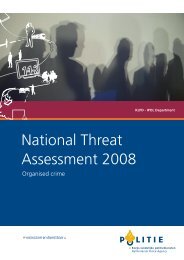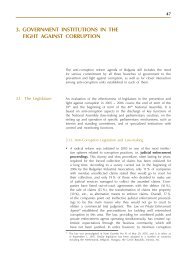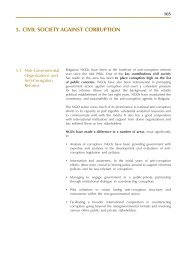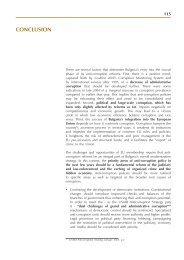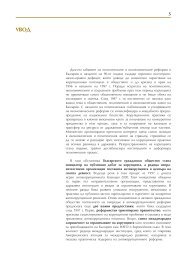Assessing the Effectiveness of Organized Crime Control Strategies ...
Assessing the Effectiveness of Organized Crime Control Strategies ...
Assessing the Effectiveness of Organized Crime Control Strategies ...
You also want an ePaper? Increase the reach of your titles
YUMPU automatically turns print PDFs into web optimized ePapers that Google loves.
2.0 Methodology<br />
L<br />
iterature reviews tend to contain, at most, very brief sections describing <strong>the</strong> manner in which<br />
documents have been located and specifying <strong>the</strong> criteria serving as <strong>the</strong> basis for <strong>the</strong>ir<br />
inclusion. However, <strong>the</strong> process <strong>of</strong> identifying and selecting materials for this review was<br />
challenging due to <strong>the</strong> breadth and complexity <strong>of</strong> OC, as well as <strong>the</strong> dearth <strong>of</strong> evaluative studies<br />
that fit <strong>the</strong> conventional mould.<br />
The terrain <strong>of</strong> OC is so broad—covering such a wide range <strong>of</strong> illicit activities—that <strong>the</strong> pool <strong>of</strong><br />
materials through which one must sort is daunting. As an illustration, an initial search <strong>of</strong> several<br />
electronic databases yielded more than 800 documents covering <strong>the</strong> relatively short period from<br />
1990-2003. One must <strong>the</strong>refore engage in a major selection process to reduce <strong>the</strong> volume <strong>of</strong><br />
documents to a manageable number.<br />
Apart from <strong>the</strong> sheer volume <strong>of</strong> materials, <strong>the</strong>re are differences <strong>of</strong> opinion regarding <strong>the</strong><br />
definition <strong>of</strong> organized crime and, hence, <strong>the</strong> scope <strong>of</strong> activities subsumed within <strong>the</strong> concept.<br />
Also, <strong>the</strong> document selection process is rendered difficult by <strong>the</strong> fact that very few studies have<br />
rigorously evaluated OC control strategies through conventional research designs. For example,<br />
if one was to review treatment programs for men who batter <strong>the</strong>ir spouses, <strong>the</strong>re is a finite pool<br />
<strong>of</strong> several dozen experimental and quasi-experimental studies evaluating <strong>the</strong> effectiveness <strong>of</strong><br />
<strong>the</strong>se programs.<br />
In <strong>the</strong> context <strong>of</strong> OC, such designs would involve <strong>the</strong> careful monitoring <strong>of</strong> a control strategy<br />
(e.g., a law enforcement initiative), ei<strong>the</strong>r from <strong>the</strong> outset or after <strong>the</strong> fact, to determine whe<strong>the</strong>r<br />
statistically significant reductions in specified illicit activities or o<strong>the</strong>r changes have occurred<br />
following <strong>the</strong>ir implementation or in relation to comparable jurisdictions in which such<br />
initiatives have not been adopted. The use <strong>of</strong> such designs is virtually non-existent in<br />
assessments <strong>of</strong> <strong>the</strong> impact <strong>of</strong> OC control strategies. In fact, Maltz (1990:15) argues that <strong>the</strong><br />
classic experimental designs cannot be used in evaluating <strong>the</strong> success <strong>of</strong> OC control efforts, “as<br />
this would be tantamount to advertising that <strong>the</strong> “control” jurisdictions are (and will remain) free<br />
<strong>of</strong> federal enforcement efforts.”<br />
That highly rigorous assessments are few in number is a conclusion drawn not only by this<br />
author but in some <strong>of</strong> <strong>the</strong> most authoritative texts on OC. For example, Reuter (1994:91) asserts<br />
that <strong>the</strong> OC literature as a whole has failed to attract much scholarly attention: “It would be<br />
difficult to identify as many as half a dozen books that report major research findings, or even<br />
that many significant articles.”<br />
Martens (1983; cited in Beare, 1996:35) adds that, “The field <strong>of</strong> organized crime research, to say<br />
it modestly, suffers from ‘intellectual atrophy.’ Little is written that deserves our attention and<br />
that which is written <strong>of</strong>ten does not reflect reality…Particularly when it comes to addressing<br />
public policy issues with respect to organized crime control, <strong>the</strong> field could use a healthy dose <strong>of</strong><br />
‘real world’ experiences.”<br />
Research and Statistics Division / Department <strong>of</strong> Justice Canada | 3



